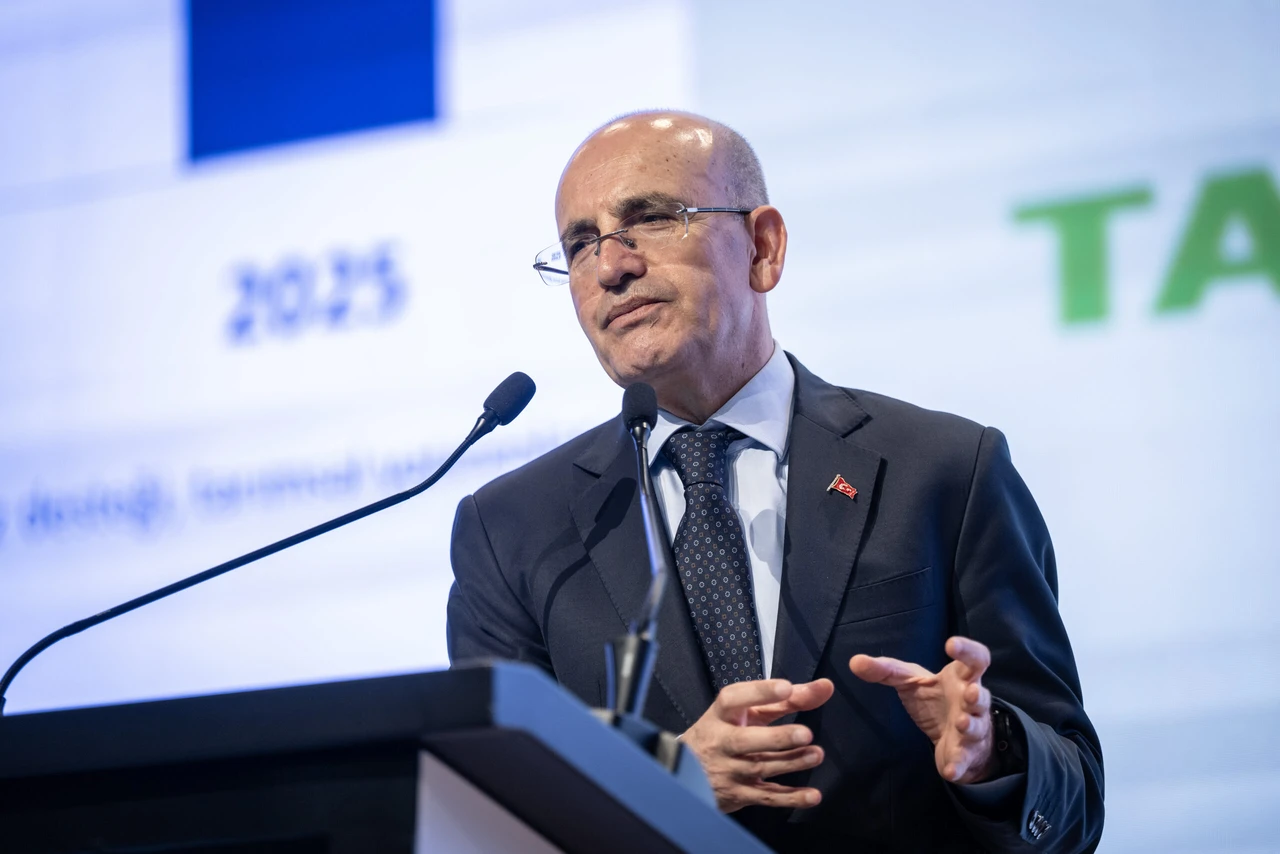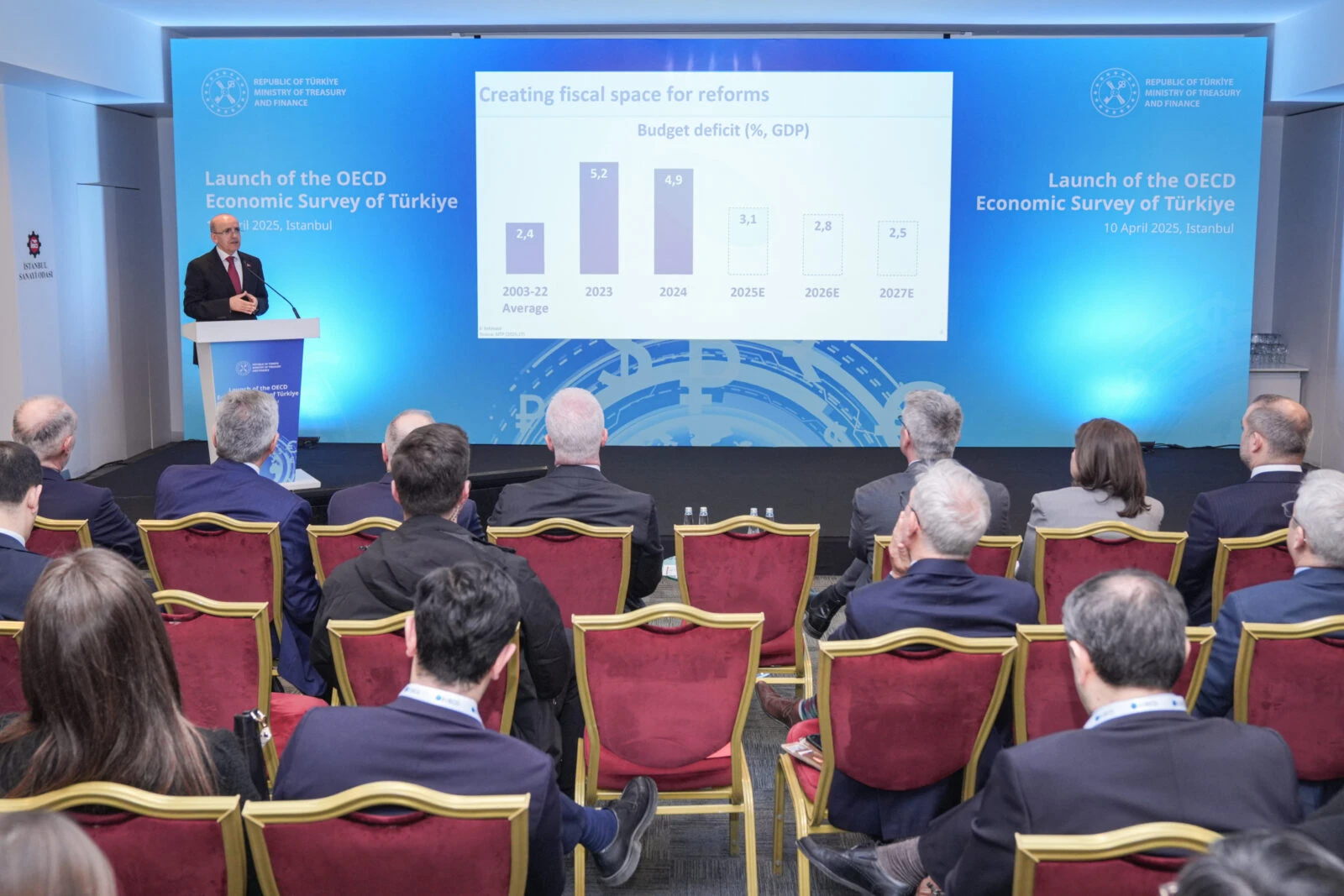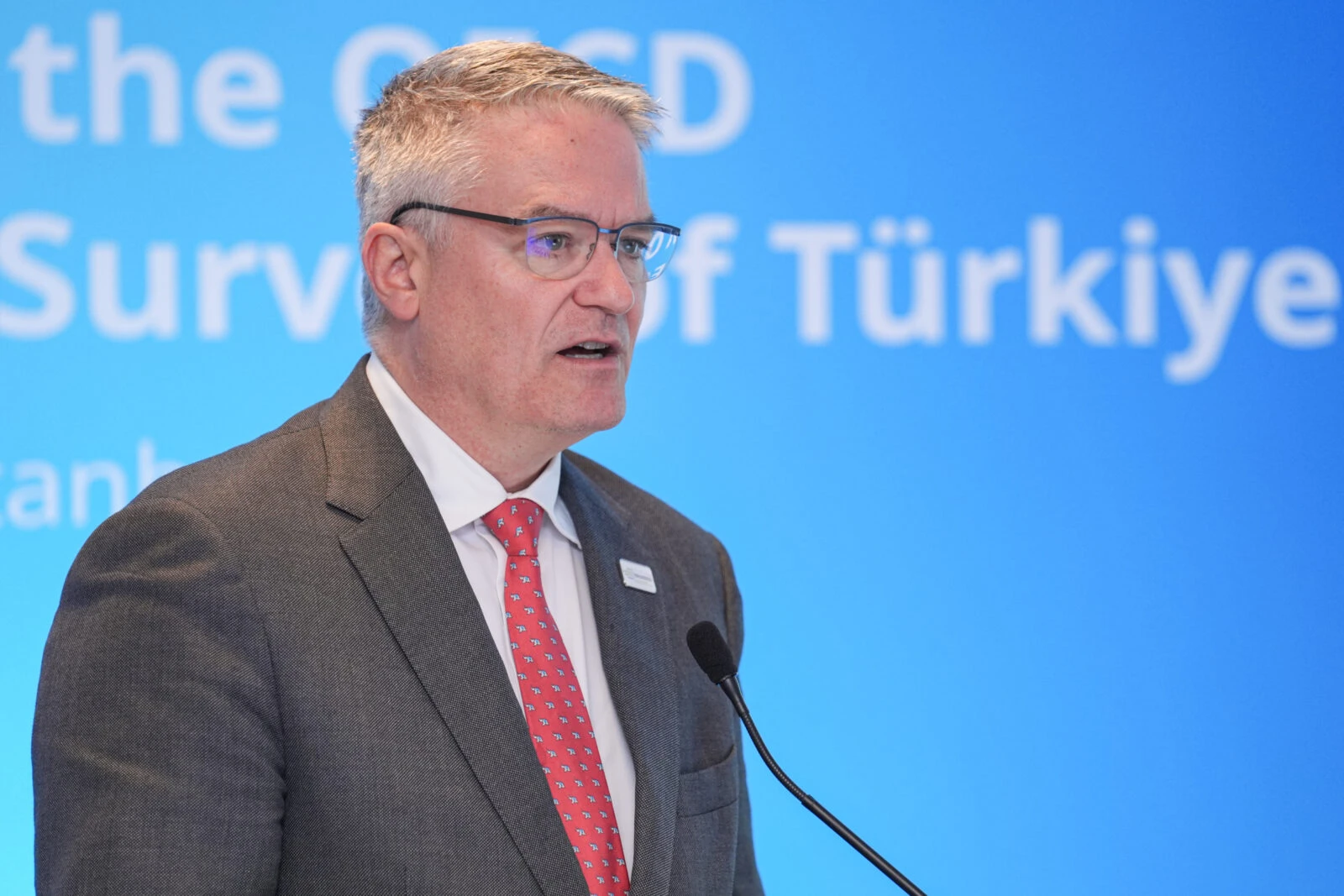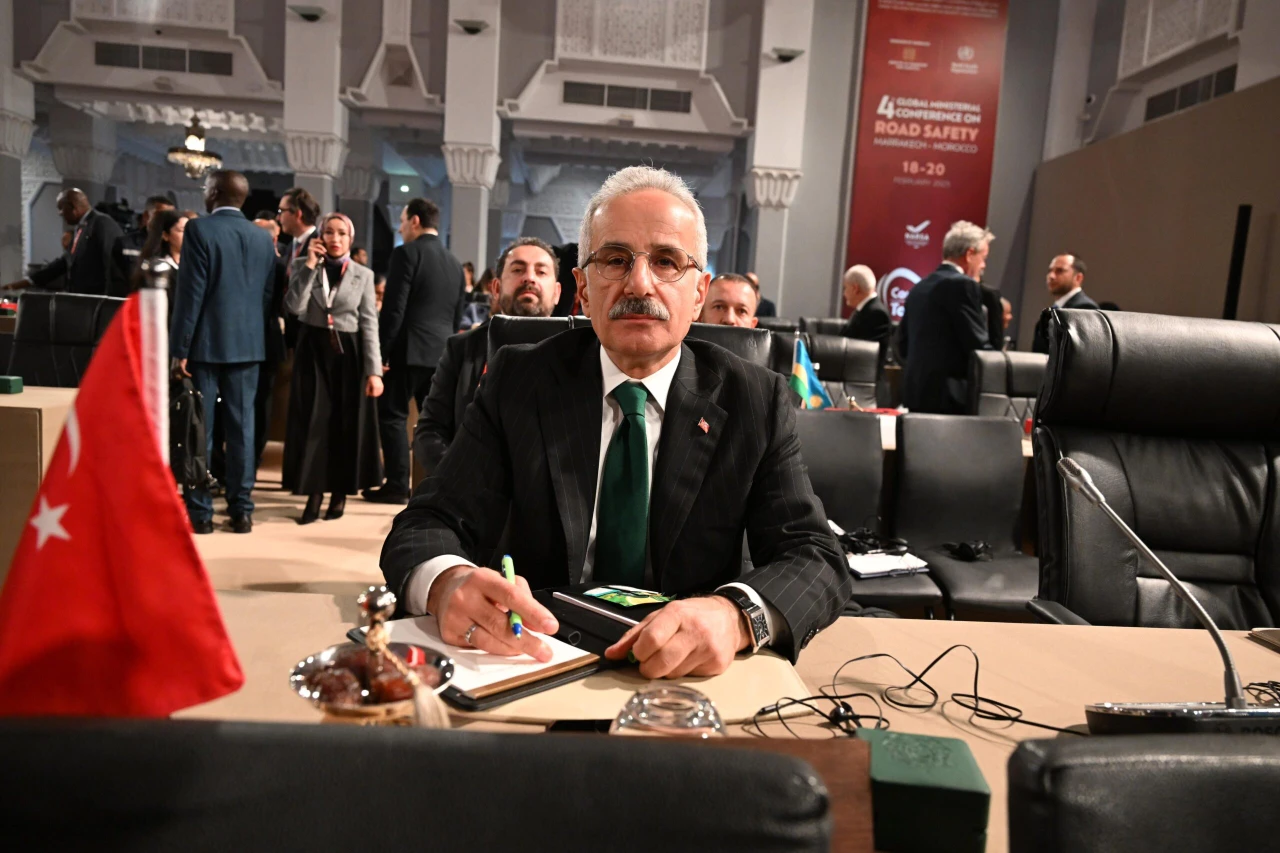‘Headwinds won’t derail disinflation,’ OECD applauds Türkiye’s growth
 Treasury and Finance Minister Mehmet Simsek delivers a speech at the Agricultural Economy Workshop, held at the General Directorate of Forestry as part of the 4th Agriculture and Forestry Council in Ankara, Türkiye, on Apr. 7, 2025. (AA Photo)
Treasury and Finance Minister Mehmet Simsek delivers a speech at the Agricultural Economy Workshop, held at the General Directorate of Forestry as part of the 4th Agriculture and Forestry Council in Ankara, Türkiye, on Apr. 7, 2025. (AA Photo)
Turkish Treasury and Finance Minister Mehmet Simsek reaffirmed Türkiye’s commitment to fiscal discipline and inflation control despite global economic uncertainties during the launch of the OECD’s latest country report on Türkiye in Istanbul.
“Despite global volatility posing downside risks to growth, we will maintain spending discipline in public finances and succeed in reducing inflation,” he stated.
Speaking at the OECD’s “Emerging Markets Forum” on Thursday, Simsek welcomed the independent assessments featured in the OECD Türkiye Economic Survey, which evaluates Türkiye’s performance against peer economies. He emphasized that many of the report’s recommendations are already being implemented within the government’s current economic program.

“Our primary objective is to lay the groundwork for strong, sustainable, and high-quality growth,” Simsek said, adding that price stability remains a cornerstone of the strategy. He acknowledged the progress made in the fight against inflation while warning that the path ahead would require time and persistence.
‘Turkish central bank done outstanding job’
Simsek praised the Turkish central bank’s performance under its current leadership, led by Governor Fatih Karahan. “The central bank governor and his team have done an outstanding job by taking the right steps in monetary policy,” he said, also noting OECD Secretary-General Mathias Cormann’s acknowledgment of Türkiye’s monetary tightening efforts.
He noted that Türkiye’s public debt-to-GDP ratio remains below 25%, and that fiscal discipline stems not from debt sustainability concerns, but from a desire to support the central bank’s inflation fight and to create fiscal space for structural reforms.
Simsek expects inflation expectations to fall to the mid-20% range by the end of 2025, to 10% in 2026, and into single digits thereafter. “Income policies will be more supportive this year. Administered prices are being adjusted in line with inflation targets, and we are accelerating supply-side measures, particularly in housing and food,” he added.
Türkiye’s inflation extended its decline to a 10th consecutive month in March, cooling down to 38.1%, according to the Turkish Statistical Institute (TurkStat).
Positioning green transformation as a necessity rather than a choice, Simsek revealed Türkiye’s goal of attracting at least $100 billion in renewable energy investments over the next decade. “In the last 25 years, we’ve paid nearly $1 trillion for oil and gas imports—1.5 times the total current account deficit in the same period. Reducing fossil fuel dependence is crucial for macro-financial stability,” he explained.
Almost half of Türkiye’s electricity production last year came from renewable sources. The government aims to increase this to 70% by 2035. A draft Climate Law is currently under parliamentary review, and Simsek expressed hope for its approval this year.
He also underlined efforts to improve productivity and increase high-tech exports through investments in digital infrastructure, including fiber networks, 5G, data centers, and a domestic GPS initiative.
Simsek also acknowledged Türkiye’s demographic challenges, particularly the declining birth rate and slowing growth of the working-age population. “Our working-age population will continue to grow until 2035, but the pace will decelerate. Therefore, we must boost female labor force participation,” he said, noting the current rate of 36%, well below the OECD average of 67%.
To address this, the government has introduced measures such as extending parental leave, enhancing family support payments, and ensuring free access to education and healthcare from preschool to PhD levels.
The minister highlighted railways as the new infrastructure priority, following extensive investments in highways and airports. “Our top priority now is efficient infrastructure—railways—because they help reduce carbon emissions and boost competitiveness,” he stated.
He also stressed the importance of regional trade integration, particularly updating the Customs Union with the EU to include public procurement, services, and agriculture.
OECD highlights Türkiye’s growth, urges structural reforms
According to the OECD’s Türkiye Economic Survey, the country has experienced one of the fastest growth rates among OECD members over the past decade, averaging 4.9% annually. This growth has significantly improved living standards and reduced poverty by half.
Labor force participation among the 15–64 age group rose from around 50% in 2005 to 60% in 2023. Türkiye also made progress in decoupling economic growth from environmental pressures, such as emissions and water use.
However, the OECD cautioned that Türkiye must maintain tight macroeconomic policies until inflation aligns with official targets. The report forecasts Türkiye’s economy to grow by 3.1% in 2025 and 3.9% in 2026, with inflation expected to drop to 31.4% this year and 17.3% by 2026.
While public debt remains relatively low, budget deficits are expected to narrow to 2.6% of the gross domestic product (GDP) by 2026. Investments and public spending are projected to decline, but exports may rise gradually amid improving external conditions.
The OECD emphasized that Türkiye’s continued economic convergence with advanced economies depends on structural reforms aimed at improving spending efficiency, expanding tax revenues, and promoting inclusive growth.
The organization urged Türkiye to address structural issues such as an aging population and low female labor participation, by removing barriers to employment and expanding access to early childhood care. It also recommended accelerating the green transition by pricing emissions more effectively and phasing out coal in energy production.
Speaking at the forum, OECD Secretary-General Mathias Cormann praised Türkiye’s macroeconomic policy shift and the resulting improvement in investor sentiment. “There are opportunities to do even better. Enhancing productivity remains a key priority for Türkiye,” he said.

Cormann noted that Türkiye is one of the fastest-growing economies in the OECD and stressed the importance of building on this progress. “As a founding member of the OECD, Türkiye plays a vital role. We look forward to deepening our partnership, especially in public finance reform, fostering innovation, increasing opportunities for women, and accelerating climate transition,” he concluded.



